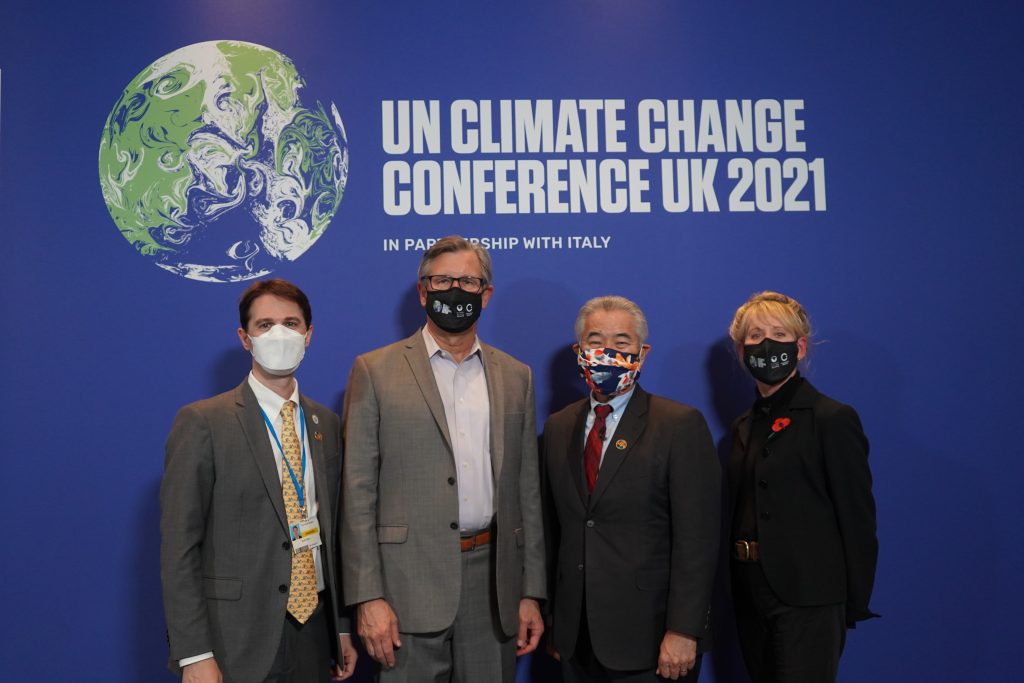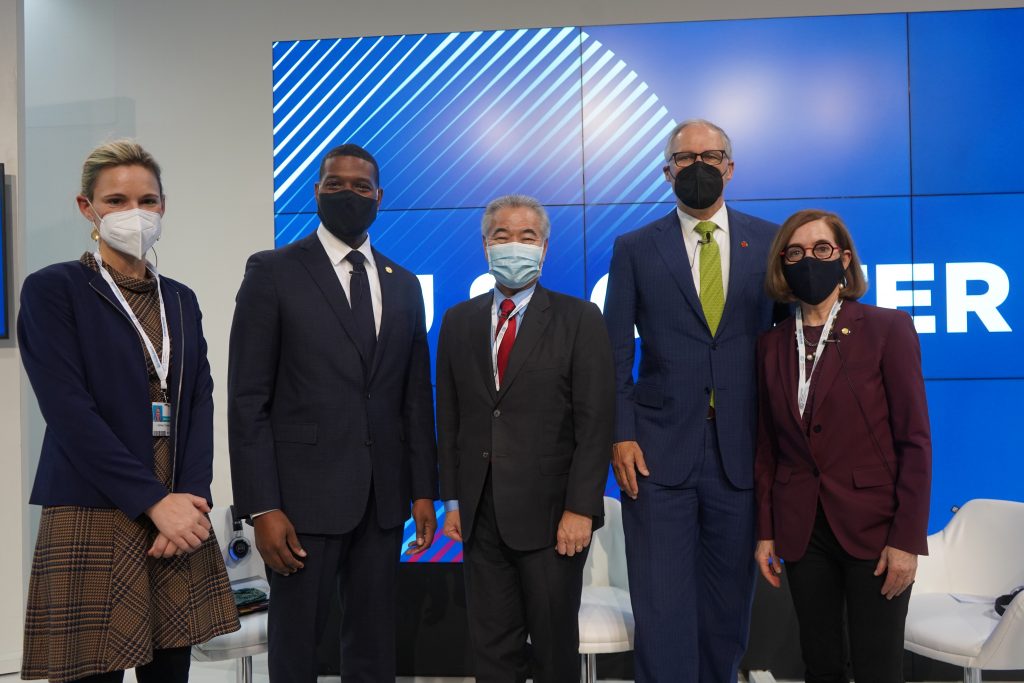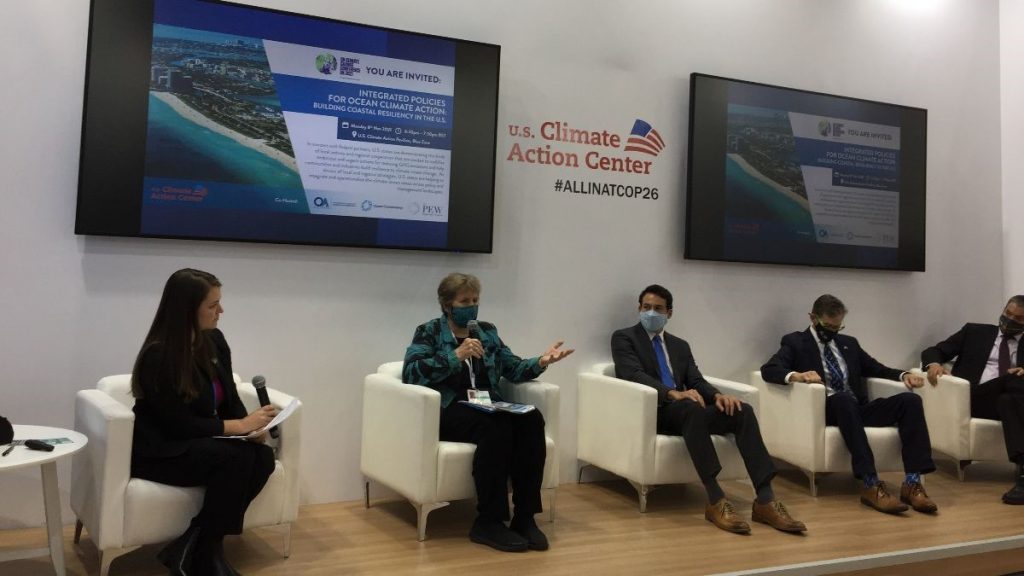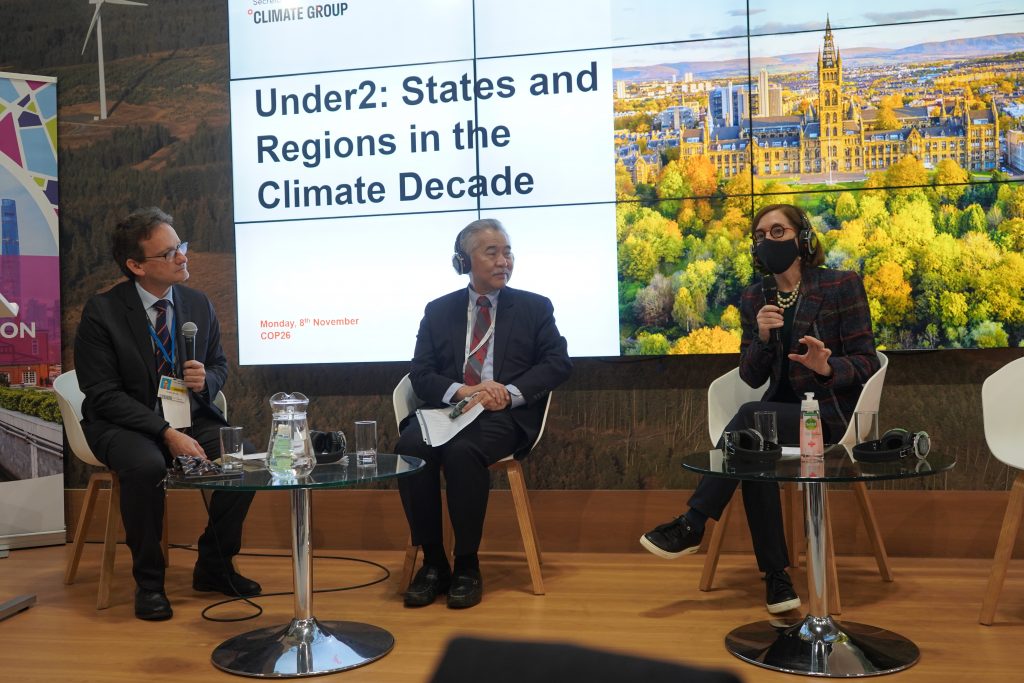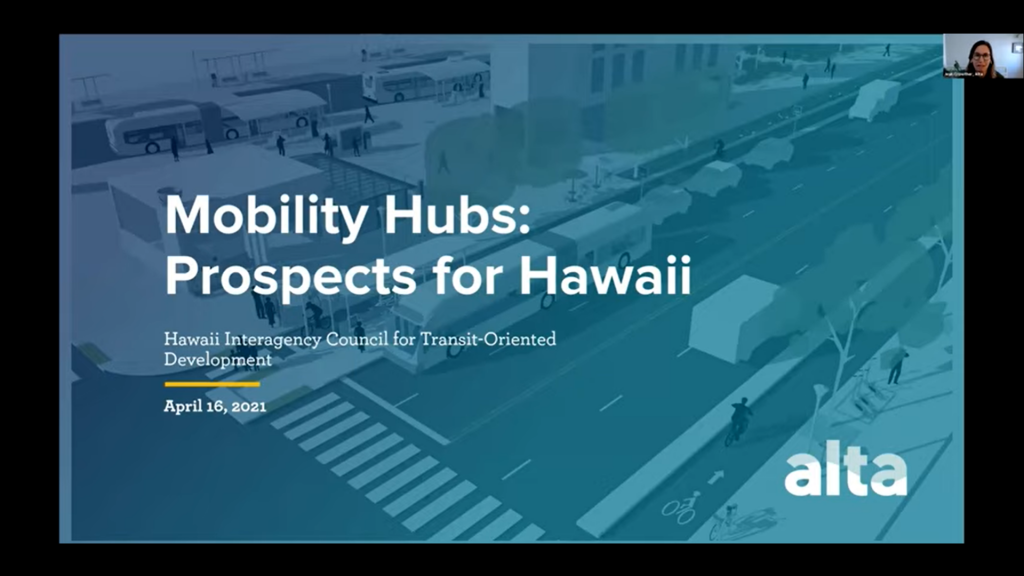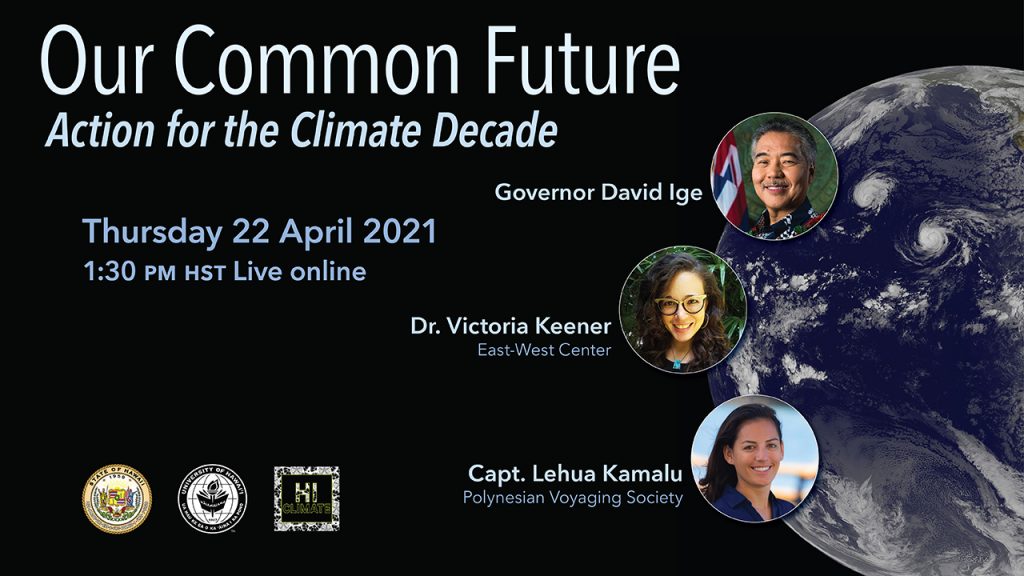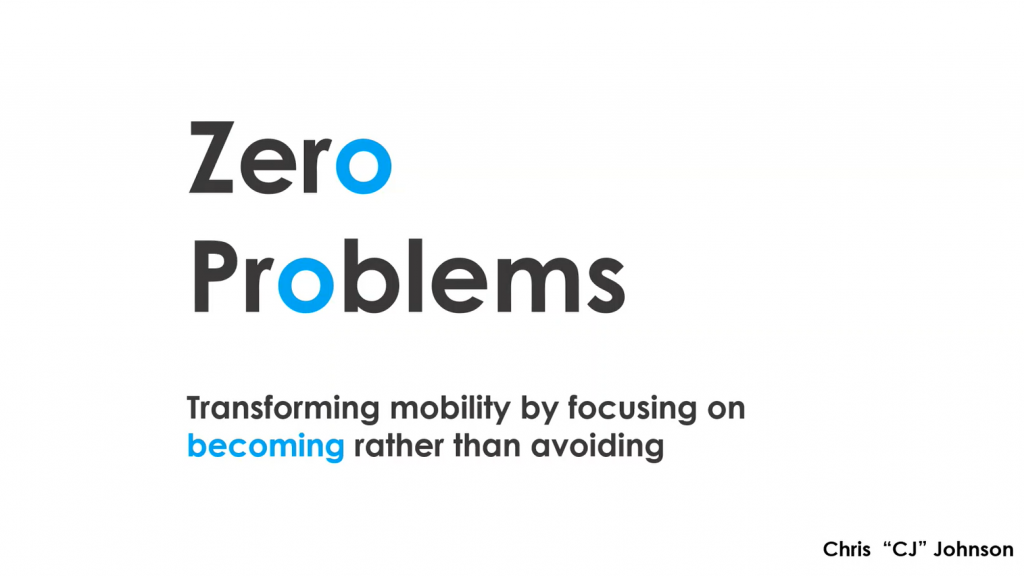- Home
- Critical Decade
- HI Climate Action
- HI Commission
- HI Resources
- HI Equity
- HI Events
Webinars

The Climate Registry // November 11, 2021
Sub-national action is essential to decarbonize the global economy and meet the Paris Agreement goals. Innovative leaders from the U.S. and Mexico will highlight policies, practices and partnerships that are driving results on the road to net zero.
Speakers:
- Governor David Y. Ige, Hawaiʻi
- Liane Randolph, Chair, California Air Resources Board
- Sofía Hernández Morales, Executive Director of Transversality and Territorial Governance, Jalisco, Mexico
- Katie Theoharides, Secretary of Energy and Environmental Affairs, Massachusetts
#COP26 – Further, Faster, Together: A State-Federal Partnership for a Net-Zero Future
The U.S. Climate Action Center at COP26 // November 9, 2021
Join Governor Ige and other U.S. leaders at the U.S. Center to learn more about how America is taking ambitious steps to combat the climate crisis.
#COP26 – Building Coastal Resiliency in the U.S.
The U.S. Climate Action Center at COP26 // November 8, 2021
As drivers of local and regional strategies, U.S. states are on the forefront of increasing ambition for climate action, integrating ocean and climate policies and increasing effective management across our estuaries and shorelines in the context of climate change.
Featured Speakers:
- Governor Jay Inslee, State of Washington
- Governor Kate Brown, State of Oregon
- Dr. Libby Jewett, NOAA’s Ocean Acidification Program Director
- Secretary of Natural Resources, Wade Crowfoot, State of California
- Secretary of Environment, Ben Grumbles, State of Maryland
- Chair of Department of Land and Natural Resources, Suzanne Case, State of Hawai’i
- Senator Chris Lee, Hawai’i State Legislature
#COP26 – Under2: States and Regions in the Climate Decade
Under2 Coalition // November 8, 2021
The “Under2: States and Regions for the Climate Decade” event showcased state and regional actions that are leading climate ambition during “the critical 20s decade,” otherwise referred to as the Climate Decade.
David Ige, Governor, Hawaiʻi, US, recalled his state’s climate target to be carbon net negative by 2045, saying “we have a sense of community and are all willing to make the commitment and take the actions necessary individually and collectively. We know we can only be successful as a community.” He also highlighted the commitment to join Trillion Trees by protecting or replanting 100 million trees in Hawai’i, which is 10% of the global goal. Ige shared the successful passing of a resolution during the recent IUCN World Conservation Congress for the formation of a new climate action coalition as testament to the power of young people.
#COP26 – Green, Blue & Equitable – Highlighting & scaling US states’ best practices for increasing resilience
Climate Action Reserve, The Climate Registry // November 8, 2021
This event showcases state leadership on resilience, specifically how U.S. states are building resilience in day-to-day decisions, assets, and planning and investments to incorporate adaptation and resilience into the Paris Framework. Nature- and ecosystem-based solutions, green infrastructure, investments in community and regional capacity, and carbon-smart practices must be implemented now and prioritized in all planning and future actions as part of climate readiness and resilience—these solutions also provide a multitude of economic, environmental, and social co- benefits. For states to best utilize state, federal, and private investments, it is essential that resilience investments be guided by equity considerations. Recognizing that building resilience requires a systems approach that drives investment in adaptation across built, natural, and social communities- the panel focuses on how adaptation and other climate-smart land management practices can provide ecological and economic resilience for communities, increase food system resilience (a key social determinant of public health) and provide the essentials elements needed for a clean, equitable, and resilient future. Panelists include:
- Anukriti (Anu) Hittle, Hawai‘i Climate Change Mitigation & Adaptation Coordinator
- Secretary Kathleen A. Theoharides, Secretary, Massachusetts Executive Office of Energy and Environmental Affairs
- Secretary Ben Grumbles, Secretary Maryland Department of the Environment
- Basil Seggos, Commissioner of the New York State Department of Environmental Conservation
- Amanda Martin, Chief Resilience Officer, North Carolina Office of Recovery and Resiliency
- Brian Ambrette, Senior Climate Resilience Coordinator, Maine Governor’s Office of Policy Innovation and the Future
- Frank Kohlasch, Climate Director, Minnesota Pollution Control Agency
- Anne Miller, Colorado Resiliency Office Director, Department of Local Affairs
Organized by the State of Hawai’i and the US Climate Alliance.
COP26 Pathways to 1.5 Pavilion hosted by Climate Action Reserve and The Climate Registry.
Mobility Hubs: The Future of Multimodal Transportation Networks
Atla Planning + Design // May 11, 2021
Transportation networks are the backbone of modern society. They connect people to important destinations and are necessary to sustain every industry and many aspects of personal life. However, these rigid and car-centric systems planned decades ago often fail to accommodate the shift in transportation habits needed to achieve ambitious climate, energy, and equity goals. Mobility hubs have the potential to change transportation systems, and can lay the foundation for public transit, micromobility, and essential amenities to be more easily accessible to those who need them most.
Jean Crowther is a planner and a Principal at Alta. She leads the company’s new mobility services nationally, which includes working on mobility hub studies in Oregon, Utah, North Carolina, South Carolina, Florida, and California. Derek Abe is a transportation planner at Alta, and leads Complete Streets, New Mobility, and multimodal planning and design practice on the West Coast. He is based in Portland, but Oʻahu grown!
Click here to see more resources relating to transportation and climate change.
Our Common Future: Climate Action in the Climate Decade
UH Better Tomorrow Speaker Series // April 22, 2021
A special Earth Day conversation with Governor David Ige on Hawai‘i’s plans for the coming Climate Decade. Also featuring Captain Lehua Kamalu of the Polynesian Voyaging Society and Dr. Victoria Keener, Senior Research Fellow at the East-West Center. Moderated by Robert Perkinson.
Hosted by the Office of the Governor and the Climate Change Mitigation and Adaptation Commission.
Vision Zero: Transforming Mobility by Focusing on Becoming Rather Than Avoiding
Vision Zero // February 26, 2021
Presenter CJ Johnson takes the Climate Ready Hawaiʻi VISTA cohort through the history that has enabled a car-centric world, key concepts of traffic violence, and how Vision Zero plans to bring equity to the forefront of our transportation system. He is the physical activity coordinator at the Hawaiʻi State Department of Health. CJ has extensive experience with Vision Zero in several states and roles ranging from agency planner to advocacy leader, and now as a public health program specialist.
Click here to see more resources relating to transportation and climate change.

